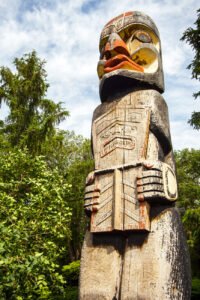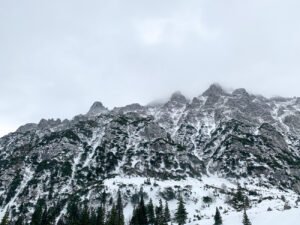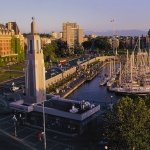Unravel more than a 1000 years of History & Heritage of British Columbia
The history of the land now called British Columbia began with the migration of people from Asia across the Bering land bridge (now the Bering Strait) to modern-day Alaska, British Columbia, and destinations farther afield. This scientific assumption is based on the genetic link to people in parts of Asia and the theory that nomadic hunters followed moose, deer, elk and buffalo as food sources, moving farther south as the ice sheets melted.
The earliest evidence of human habitation in Canada is an old fishing weir found in the ocean in the Haida Gwaii islands off the west coast of British Columbia. Based on radiocarbon dating from another archeological site on the island, the weir could date back 13,800 years. These First Nations people lived and flourished on the natural resources of the land, sustained by the bountiful salmon runs and abundant berry crops and indigenous wildlife.
The birthplace of modern British Columbia is the small community of Yuquot, also known as Friendly Cove, on the west coast of Vancouver Island, the site of the first contact between Europeans and the First Nations people in British Columbia. First Nations in British Columbia today constitute a considerable number of First Nations governments and peoples.

The community of Yuquot (Friendly Cove) on the west coast of Vancouver Island, British Columbia.
History and Heritage in British Columbia
- History and Heritage Tours in British Columbia
- History and Heritage in British Columbia
- Events in the History of British Columbia
- History and Heritage of Vancouver Island
- Events in the History of Vancouver Island
- British Columbia Archives
History and Heritage Tour Operators in British Columbia

Biographical Info
Explore BC and Southeast Alaska with Bluewater Adventures aboard our 70′ yachts sailing the BC Inside Passage, the Queen Charlotte Islands, Gwaii Haanas National Park, the Great Bear Rainforest, and Vancouver Island. You’ll see whales, Grizzly, Black and Kermode bears, and experience ancient native villages and Haida culture, primeval forests, wilderness, and amazing coastal wildlife.
The History & Heritage of British Columbia (BC) is a rich tapestry woven from the diverse narratives of Indigenous peoples, European explorers, and international immigrants who have shaped the province’s cultural landscape. This complex history not only defines the social fabric of the region but also contributes to its distinctive identity within Canada and beyond.
The History & Heritage of British Columbia begins with the Indigenous peoples, who have inhabited the land for thousands of years. The coastal First Nations, including the Haida, Tsimshian, and Kwakwaka’wakw, developed complex societies based on fishing, woodcarving, and potlatch ceremonies. The interior nations like the Ktunaxa and Secwepemc were more nomadic, traversing the rugged landscapes to hunt and gather. These ancient cultures left a lasting impact on the region, influencing everything from art to governance.
European contact began in the late 18th century, with explorers such as James Cook and George Vancouver charting the Pacific Northwest. The fur trade soon followed, with the establishment of the Hudson’s Bay Company’s trading posts. This era marked a significant shift in the area’s dynamics, leading to increased settlement and the inevitable conflicts and negotiations with the Indigenous populations.
The gold rushes of the 1850s and 1860s further transformed BC, as thousands of prospectors from around the world flooded into the region, leading to rapid economic and population growth. This period accelerated the push towards confederation, and BC eventually joined Canada in 1871 under the promise of a transcontinental railway.
Throughout the 20th century, the History & Heritage of British Columbia was further enriched by waves of immigration from Asia, Europe, and other parts of Canada, making it one of the most culturally diverse regions in the country. Each group brought its own customs, traditions, and languages, contributing to the multicultural mosaic that BC is known for today.
Today, the History & Heritage of British Columbia is celebrated through numerous museums, cultural festivals, and educational programs that strive to acknowledge and honor the complex histories of its many communities. This ongoing commitment ensures that the stories of all who have contributed to the province’s development are remembered and respected.





